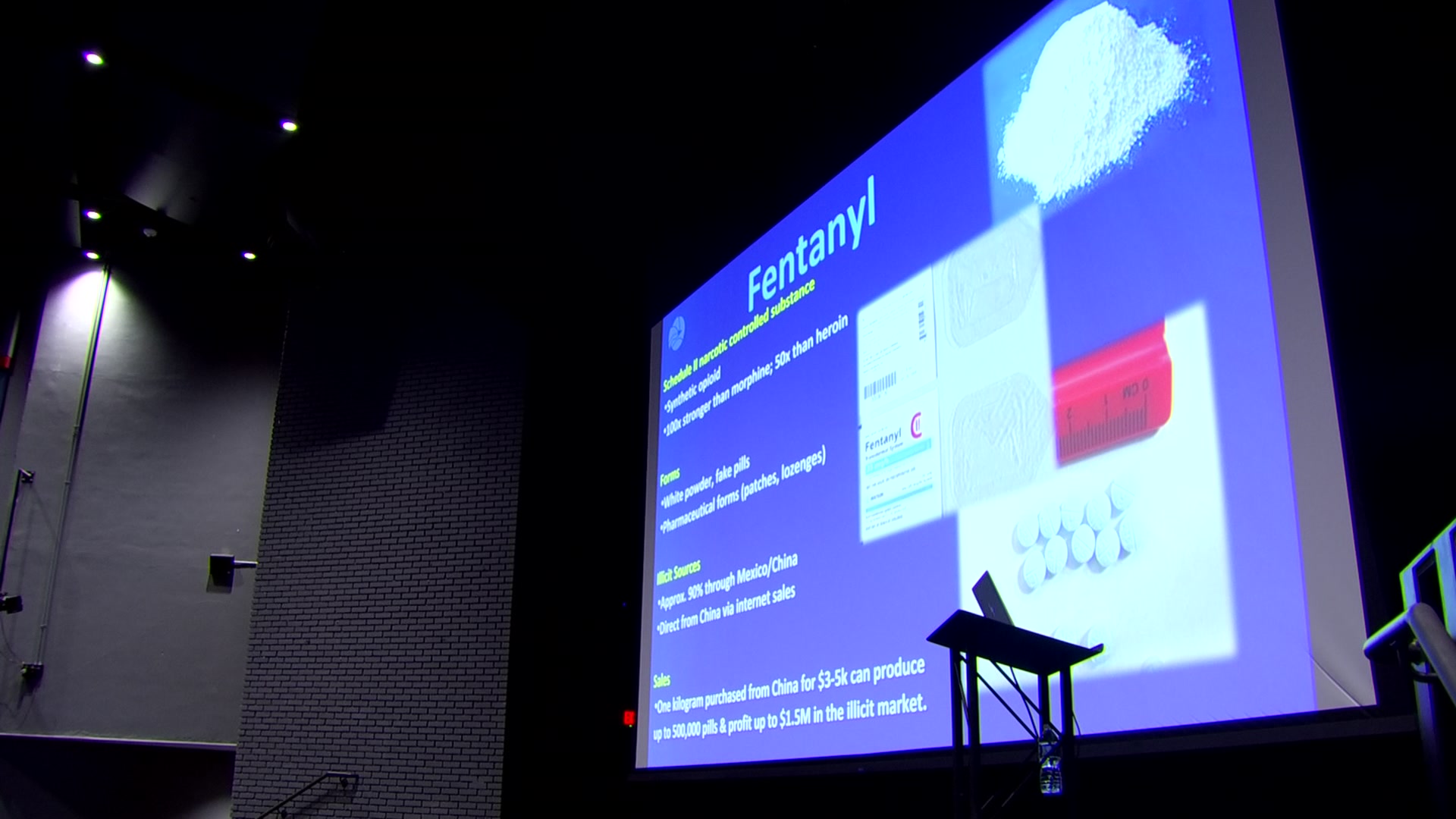A North Texas woman is facing a murder charge after police say she supplied the fentanyl that led to her boyfriend's overdose death in late 2023.
According to the Grapevine Police Department, Kami Ludwig is charged with felony first-degree murder in the death of 47-year-old William Shane Nolen.

Grapevine Police said on Nov. 20, 2023, they were called to investigate a death at a home on the 4100 block of Mapelridge Drive. Officers arrived and found Nolen's body in his bedroom with signs related to an opioid overdose.
Get DFW local news, weather forecasts and entertainment stories to your inbox. Sign up for NBC DFW newsletters.
According to the affidavit, rigor mortis had set in. The affidavit stated officers found numerous narcotics inside the home, including multiple pills believed to be Xanax (were) strewn about on the floor adjacent to the bed Nolen was found in."
"She ran to a neighbor's house and called 911," said Amanda McNew, the police department's Public Information Officer and Media Manager.
"And when officers arrived… it was obvious he'd been dead for a while."
A few feet away in the bathroom, officers said they found Ludwig's purse, which they said contained 40 blue pills. Laboratory tests completed by the Tarrant County Medical Examiner's office would later confirm the pills were laced with fentanyl. Narcotics, including cocaine, oxycodone, and alprazolam, which is the generic brand of Xanax, were recovered as evidence.
Ludwig identified herself to the police as Nolen's girlfriend. She was then arrested and charged with the possession of multiple controlled substances. However, it was not until Nolen's toxicology report was finalized that Ludwig would be accused of murder.
The affidavit said the Tarrant County Medical Examiner's report listed Nolen's cause of death as Mixed Drug Toxicity (Fentanyl, Trazodone).
"It wasn't until toxicology comes back that they can confirm that he did, in fact, die because of fentanyl," said McNew.
Grapevine Police worked alongside the Mid-Cities Drug Task Force and the DEA to investigate how Nolen got the drugs and who was responsible for the manufacturing and distribution of the fentanyl-laced pills.
"The law changed last September that makes it a murder charge if you provide someone with fentanyl pills and they die," said
In June, Governor Greg Abbott signed four laws to fight the growing fentanyl crisis. HB6 was among the statewide initiatives that went into effect on Sept. 1. Under HB6, anyone who supplies fentanyl that results in death can be charged with murder. The law also required deaths caused by fentanyl to be listed as such on a death certificate.
During the investigation into Nolen's death, the affidavit states that investigators discovered multiple messages on Ludwig's cell phone that revealed who she got her drug supply from.
The contact names on Ludwig's phone were saved as "Blue" and "T." According to the affidavit, Ludwig messaged "T" to ask if she could travel to their Fort Worth home.
During the investigation, investigators obtained a warrant to retrieve Ludwig's cell phone location data from Nov. 19. It revealed that around 7 p.m., Ludwig was at the home of "Blue" and "T."
According to the affidavit, it was just before 8:30 p.m. that "Ludwig would call Nolen from this same address in Fort Worth."
Ludwig would later travel back to Nolen's home in Grapevine and call the police at 4:45 a.m. on Nov. 20.
"She purposely reached out to someone else, drove to get the drugs, and then brought them back into his home where he died and called Nolen from the same address," McNew said.
A warrant for Ludwig's arrest was issued on Friday, Feb. 9. Police said Ludwig surrendered to authorities in Tarrant County on Monday, Feb. 12.
Ludwig's defense attorney, Tiffany Burks, released a statement following her client's arrest.
"Any fentanyl-related death is a tragedy, and our condolences go out to the friends and family affected by the sudden loss of former judge Shane Nolen," Burks said. "Fentanyl murder is a serious accusation, and judgment should be withheld until all the facts and circumstances are known. We proudly defend Kami as she, too, struggles with the loss of a beloved friend."
The Grapevine Police and other North Texas police departments want the community to know they are serious about their fight against illicit fentanyl and those that supply it.
"It's a message for users. It's a message for parents. It's a message for kids. Do not give drugs. We don't want anyone to do drugs, but we do not want them to give drugs to someone else," McNew said. "If you give someone a fentanyl-laced pill and they die, you are responsible for their death."
Since HB6 went into effect, only one person has been indicted on a murder charge for a fentanyl overdose. In December, a Tarrant County Grand Jury indicted 46-year-old Jacob Lindsay in the death of 26-year-old Brandon Harrison. Harrison died from a fentanyl overdose on Sept. 28.
FENTANYL DEATHS
WHAT IS FENTANYL?
Fentanyl is a synthetic opioid that is 50 times more potent than heroin and 100 times more potent than morphine. Just two milligrams of fentanyl, which is equal to 10-15 grains of table salt, is considered a lethal dose.
Without laboratory testing, there is no way to know how much fentanyl is concentrated in a pill or powder. If you encounter fentanyl in any form, do not handle it and call 911 immediately.
Fentanyl remains the deadliest drug threat facing this country. According to the Centers for Disease Control and Prevention, 107,622 Americans died of drug overdoses in 2021, with 66% of those deaths related to synthetic opioids like fentanyl.
Drug poisonings are the leading killer of Americans between the ages of 18 and 45. Fentanyl available in the United States is primarily supplied by two criminal drug networks, the Sinaloa Cartel and the Jalisco New Generation Cartel (CJNG).
WHAT IS RAINBOW FENTANYL?
In August 2022 the Drug Enforcement Administration issued a public advisory about the alarming emerging trend of colorful fentanyl available nationwide.
Brightly-colored fentanyl, dubbed "rainbow fentanyl" in the media, is being seized in multiple forms, including pills, powder, and blocks that resemble sidewalk chalk.
“Rainbow fentanyl—fentanyl pills and powder that come in a variety of bright colors, shapes, and sizes—is a deliberate effort by drug traffickers to drive addiction amongst kids and young adults,” said DEA Administrator Anne Milgram. “The men and women of the DEA are relentlessly working to stop the trafficking of rainbow fentanyl and defeat the Mexican drug cartels that are responsible for the vast majority of the fentanyl that is being trafficked in the United States.”
Despite claims that certain colors may be more potent than others, there is no indication through DEA’s laboratory testing that this is the case. The DEA said every color, shape, and size of fentanyl should be considered extremely dangerous.




